Finding the light: a review of a very short memoir by Ethel Rohan
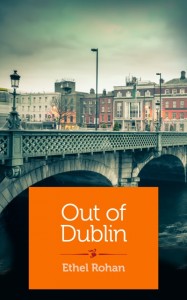 Out of Dublin
Out of Dublin
by Ethel Rohan
Shebooks, May 2014
Ethel Rohan’s Out of Dublin opens with an image I’ll not soon forget:
At the center of this memoir is the story of breaking and healing. It’s a personal tale with broad appeal, because, even as it retells one family’s many stories, it reminds us of the resilience of human beings and our desire to keep holding on, even in the face of the impossible.
I’ve been thinking about the personal memoir quite a lot lately: how much to tell, how much to leave out, why we feel compelled to tell our stories in the first place. Rohan carries two missions deep within her: a need to articulate her own story for herself, and a desire to write it down and share it – because what else would an individual of this capacity for feeling and words do?
The memoir contains painful details of life growing up in Dublin and the struggle to leave – and the reader knows from the opening that there will be wreckage along the way. Even at a young age, with five dynamic siblings and two complicated parents, the small version of Ethel has difficulty finding her place. She’s a girl searching for her song, trying to be heard. But she’s also a girl with unremitting devotion to her family. And this duality permeates the memoir: a desire to understand where she fits in a complex and painful family history, and the dedication of a daughter who loves her parents and family, flawed as they are. The writer is frank about the tough things: violence, abuse, anger, secrets. But a tenderness persists as well, amidst layers of confusion and disorientation. Straightforward language and subtle affection make this a small splendid thing.
At 10,000 words, this memoir is a glimpse at a whole life. In this way it’s not unlike flash fiction. And like Rohan’s short fictions, this story captures something large in a very small space. It is paced with alternating tempi, like life itself: sometimes the narrative lunges forward at break-neck speed and sometimes it offers up quiet moments that linger long after the reader has passed them by. Near the beginning there is a sequence that races at you, a 440-word sentence that could be an independent piece of flash fiction all its own, recollecting childhood beach trips in a Morris Minor, complete with sandy sandwiches, surfside swimming and ice cream treats – but much more than that because the sandwiches are sandy (“granules cracking between our teeth”), the swimming is competitive and “pretend” and the ice cream treats come with a side of nicotine and hard liquor. There’s also a hint of blindness on a bright summer’s day, darkness coming fast. Woven into this recollection of a family together is a story speeding to its inexorable doom. The details in this passage are carefully placed yet relentless – necessary and urgent. The memories captured here come in a flood, as if it’s important to pour it onto the page, before they are lost, like sand slipping through one’s fingers on a hot afternoon at the shore.
On the other hand, that cascading memory is balanced by short moments exhaled sharply. There’s a girl briefly dancing, for example,
“… my moves stolen from TV and ballerinas inside music boxes. I was helium. Stardust.”
The “I” is alone, already scattered to the universe, willed away from her roots. The “I” is fragmented, as are the sentences. Small breaths of life. And the “I” struggles throughout the story – moving forward and making connections back. The individual frees herself in ways she can, even using geography to her advantage, but the devotion and honour for her parents and home is never broken.
May 26th, 2014 / 10:00 am
Goodnight Nobody
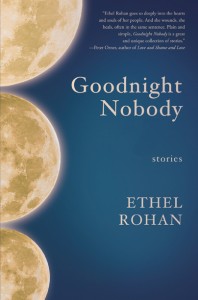 Goodnight Nobody
Goodnight Nobody
by Ethel Rohan
Queen’s Ferry Press, September 2013
138 pages
Phantom pains are a phenomena in which the patient suffers pain in a limb that is no longer part of the body. In Ethel Rohan’s Goodnight Nobody, symbolic phantom pains abound and absence makes the longing for completion more keen. There is a subdued humanity in each of the thirty stories that mix melancholy and joy with a sense of loneliness. In “The Splitting Image,” twin boys are identical apart from a missing arm on one. Despite their mirrored images, their personalities could not be more different. This disparity becomes a schism symbolized by the absent arm. One brother wants a whole arm to be complete while the other wishes his brother would “take it. Just fucking take it.” Unfortunately, it’s neither his to give nor his brother’s to take, and both are stuck as they are.
Likewise, thirteen-year-old Esther has lost her grandfather to spontaneous combustion in “Out of the Ashes.” Speculations from those around them run rampant, including ones that his death had something to do with supernatural forces. All the talk has her disconcerted and her mother has taken it hardest, verbally exploding at someone who asks about the cryptic nature of his death. Esther is helpless to act and wonders if her grandpa truly had made some type of sinister deal. The threat of such a possibility scares her and her sense of alienation is emphasized by the burn of the sun.
There’s an organic melding of themes and the obsessions the characters wield in many of the stories. In “Bee Killer,” the disconnect between a husband and wife is represented by a hive of bees the husband maintains. The emotional gulf between them is both grand and dwindling, difficult to articulate and yet swarming with stinging malcontent. He seems more concerned with the bees than her well being. It’s the quiet discontents that add up and eventually overwhelm:
“What about the queen?” I said. “The colony would be nothing without the queen.”
“She’s as much a slave to duty as the rest,” he said. “Average queen lays two million eggs in her lifetime.” He went on to tell me how a sick bee leaves the colony to die alone, so as not to infect the others. “Sacrifices himself,” he said.
“Plenty of us do that,” I said.
A photographer from “Darkroom” is going blind from a condition that is both “genetic and degenerative.” Fueled by her pending blindness, she wants to capture “the photograph of a lifetime.” The permanence of the camera becomes a substitute for the deterioration in her eyes and the visibility that will soon escape her. Capturing an image of the giraffe becomes the specific target and she goes on an adventure with her husband to get it. It seems foolhardy, until we realize it’s her way of warding off the inevitability of permanent darkness:
“I wish the blindness would just come and take my eyes right now.” Her voice shook and she held herself. “I hate the waiting.”
He pulled her into his arms and hid his tears in her hair, seeing those zoo elephants from so long ago and remembering the tickle of the animal’s trunk on his palm and the side of his face, its breath warm and pleasant, but searching, searching.
All of Rohan’s characters search for things they can’t have and the prose is elegantly wrought, neither excessively sentimental nor overtly flashy. Instead, there is a lush rhythm in the sentences that renders observations in natural beats. Judgment is suppressed in favor of an understanding of the complexities of friendship and family, however quaint or unusual. Irish settings for many of the stories act as a unique brogue against the landscape of the collection. Everyone is drifting, flotsam from the shipwreck of modern conjunctions. The shorter length of many of the stories make them seem like splices from a bigger sampling, a gauge on the tempo of a bigger macrocosm.
August 2nd, 2013 / 11:00 am
A.L. Kennedy’s The Blue Book: Fucks Body & Mind
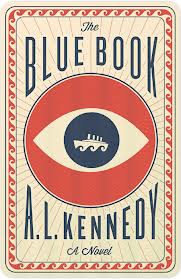 The Blue Book
The Blue Book
by A.L. Kennedy
Little A / New Harvest, March 2013
352 pages / $25 Buy from Amazon
In a New Yorker essay titled, “Everything Is Fiction,” Irish author Keith Ridgway persuasively argues that, well, everything is fiction:
Transparency is ironically pivotal to A.L. Kennedy’s latest novel, The Blue Book, a work riddled with deception. Its two main characters, Beth and Arthur, are scam artists guilty of conning people into believing they can contact the dead. As if to counterbalance the lies, codes, games, and fraud laced throughout the novel, Kennedy tells readers from the outset—in a direct address—that, here, this is a book, “your book.” She goes on to write, “It moves for you, this book, and it will always show you all it can.” The wild, wonderful sense follows that nothing is held back—not by the characters or by Kennedy. Kennedy is like a magician revealing the how of her tricks, but also insisting on the why and the nonetheless magic:
All fucking stories: what makes us nice, what makes us talk, what lets us recognize ourselves, touch others, be touched ourselves, trust loves—the fucking stories.
And they’re what works the magic: the hard-core, bone-deep, fingers in your pages and wearing your skin and fucking you magic—that magic. Inside and out.
June 24th, 2013 / 11:00 am
For Out of the Heart We Pump Our Pleas
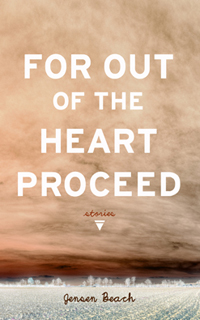 For Out of the Heart Proceed
For Out of the Heart Proceed
by Jensen Beach
Dark Sky Books, 2012
120 pages / $12.00 Buy from Dark Sky Books or SPD
The twenty-two stories in Jensen Beach’s debut collection, For Out of the Heart Proceed, center on family and in particular father and son relationships. The collection is peopled with troubled characters struggling to make sense of their circumstances, choices, and connection to others. What is perhaps most compelling about these stories are the interesting and memorable ways the characters grapple with issues of faith: Faith in themselves, others, the world, and the divine. There is great efficiency to Beach’s prose and a precise order to this collection that juxtaposes the disturbances and sometimes chaos of these characters’ lives, conflicted characters often controlled by fear.
For Out of the Heart Proceed contains three Parts linked by how its men do, and sometimes don’t, transcend their fears and difficult situations. In the first story, “Training Exercise,” a father and young son must brave the dark and what appears to be a menacing, male stranger in their back garden:
July 20th, 2012 / 12:00 pm
Unknown Arts: A Book About Joyce’s Books About … How Many of Us Are Really Sure What?
 Unknown Arts
Unknown Arts
by William Walsh
Keyhole Press, 2012
142 pages / $9.99 Buy from Keyhole Press or Amazon
Unknown Arts by William Walsh (Keyhole Press, 2012) is a collection of critical appropriations sourced from James Joyce’s Ulysses, Finnegan’s Wake, A Portrait of the Artist as a Young Man, Dubliners, and more. A book about Joyce’s books, Unknown Arts can be read as analysis, distortion, homage, and/or a work of art all of its own. It is doubtless a contentious book that will likely add fuel to the ongoing and often fiery debates around contemporary criticism, the imprint of influence, and the nature of creativity. Controversial or not, the collection is a valuable artifact that allows rare access into what are for many the impenetrable works of a literary master.
Here’s an excerpt from one of the many texts in the collection appropriated from Ulysses (1922), titled “Sunny Jim 2”:
April 2nd, 2012 / 12:00 pm
NOON Annual 2012: Blunt Reality as Source
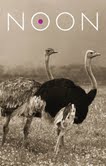 NOON Annual 2012
NOON Annual 2012
Ed. Diane Williams
$12 / Purchase directly from NOON
After reading NOON Annual 2012, I again dwelled on the nature and the value of the short-short story. I despair that short-short works are sometimes disparaged as underdeveloped and unworthy, and this issue of NOON proves the perfect response to such cynicism and dismissals.
First, the design and aesthetics of this literary magazine are first-rate. The book is smooth to the touch, bears weight, and courts the eye. There’s a smell from these pages that, while not pleasant per se, is definite. Definite is not to be underrated. This book is elegant and glamorous. Even the spine is a standout. I pored so long over Bill Hayward’s black and white photograph on page 107, the work bears my countless greasy prints. I love how the subjects here seem afloat, as if there is no ground, as if the whole point is to throw out our assumptions and re-see. Animal portrait photographer Valerie Schaff’s cover is memorable and her self-portrait on the inside cover is stunning and affecting. She writes, “When I am present, I am beyond the notion of predictability.” This quote proved my guide for the reading and the appreciation of the entire issue.
March 9th, 2012 / 1:00 pm
